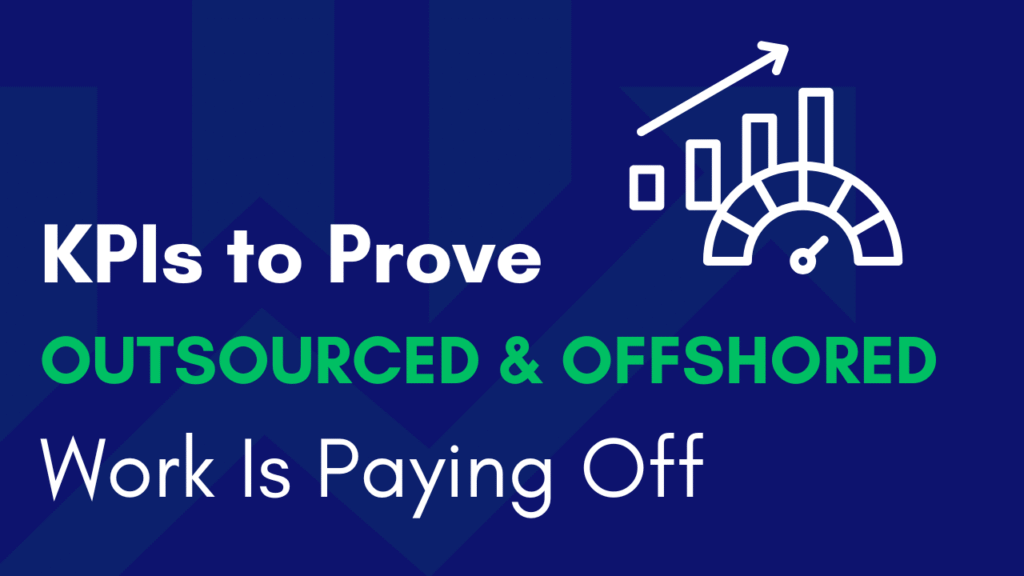15 Essential KPIs UK Accounting Firms Should Track to Measure Outsourced & Offshored Work
The finance-and-accounting outsourcing (FAO) market is forecast to hit US $54.8 billion in 2025 and keep climbing at 8% CAGR through 2030.
Gartner predicts 60 % of FAO contracts won’t be renewed by 2025 because firms can’t show hard ROI.
Tracking the right key performance indicators (KPIs) is how your practice avoids that trap.
Why KPIs Matter After You Outsource or Offshore
Transparency
Clear metrics hold external teams accountable and spotlight hidden bottlenecks.
Profit protection
Small percentage swings in billable utilisation or error rate can wipe out margin on fee-pressured work.
Renewal leverage
Documented performance against SLAs arms you in vendor negotiations (or makes switching painless).
How to Choose the “Right” KPI Mix
-
Map KPIs back to goals – cost-save, quality-lift, faster delivery, or growth capacity?
-
Balance leading & lagging indicators – e.g., Turnaround Time predicts client satisfaction; Gross Profit % confirms it.
-
Set baselines before transition – measure in-house performance for 1-2 cycles, then compare.
-
Keep it lean – 6–8 core KPIs per function prevents dashboard fatigue.
The 15 Must-Track KPIs
Operational Efficiency
- Billable Utilisation Percentage
Formula: Billable Hrs ÷ Total Available Hrs × 100
Good Results: 55 – 60 % for staff; >70 % for seniors
- Turnaround Time
Formula: Date Outsourced Work Received → Date Delivered
Good Results: < 48 hrs for payroll; < 5 days for VAT
- Audit Cycle Time
Formula: Engagement Start → Final Report
Good Results: Cut ≥15 % vs prior year
Quality & Compliance
- Accuracy / Error Rate
Formula: Errors ÷ Transactions × 100
Good Results: ≤1 % (finance aims “as close to 0 % as possible”)
- Cost-Savings ROI
Formula: (In-house Cost – Outsourced Cost) ÷ Outsourced Cost
Good Results: ≥30 % first year
- Regulatory Compliance Rate
Formula: Compliant Filings ÷ Total Required Filings
Good Results: 100 %
Financial Health
- Gross Profit Margin on Outsourced Work
Formula: (Revenue – Direct Cost) ÷ Revenue × 100
Good Results: Target +10 pts vs in-house
- First-Pass Yield
Formula: Jobs Accepted w/out Rework ÷ Total Jobs
Good Results: >97 %
- Revenue per FTE (Blended)
Formula: Fee Income ÷ (On-shore + Off-shore FTEs)
Good Results: Rising quarter-on-quarter
Client & Team Experience
- Client Satisfaction (CSAT)
Formula: Positive Scores ÷ Responses × 100
Good Results: >85 %
- Employee Utilisation Balance Index
Formula: Non-billable Hrs ÷ Total Hrs
Good Results: ≤25 %
- Team Integration Score
Formula: Survey Avg. on Communication, Knowledge Share
Good Results: >4/5
Scalability & Risk
- Issue Resolution Time
Formula: Date Ticket Raised → Date Closed
Good Results: <24 hrs (P1); <72 hrs (P2)
- Staff Turnover (Vendor)
Formula: Departures ÷ Average Headcount × 100
Good Results: <15 %
- Risk Mitigation Score
Formula: Weighted Rating of Controls Met
Good Results: 90 % +
*Benchmarks vary by practice size and service-line; use them as directional targets.
Tools & Dashboards Worth Considering
| Need | Tool Category |
|---|---|
| Effortless utilisation tracking | Practice-management suites (Karbon, AccountancyManager) |
| Real-time error alerts | Cloud GLs + data-validation add-ins |
| KPI visualisation | Power BI, Looker Studio, or a simple Google Sheet connected to APIs |
Quick-Win 30-Day Action Plan
-
Pick Your Core 6 – 3 strategic + 3 operational KPIs.
-
Baseline Them – Pull last quarter’s numbers before migration.
-
Set Targets & SLAs – Bake thresholds into vendor contract.
-
Automate Collection – Link time-tracking and GL feeds to a live dashboard.
-
Review at 30 & 90 Days – Adjust staffing mix or process if metrics lag.
FAQs for Accounting Firms:
Finance leaders aim for ≤1 % error rate, with many pushing for “near-zero” in high-risk processes
Divide total billable hours by available hours in the period, then multiply by 100. A 55–60 % staff utilisation is common, but top-tier firms push above 70 % for seniors
Most practices see cost-saving ROI immediately but need 1–2 reporting cycles to improve quality and turnaround metrics.
Find out more about offshoring vs outsourcing
Want to ask questions or discuss anything?
Feel free to book a call with one of our growth experts:
Want to join the club?
Join our accounting firm growth club to keep up to date with resources to help your firm grow:










